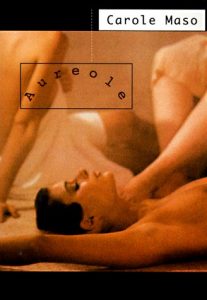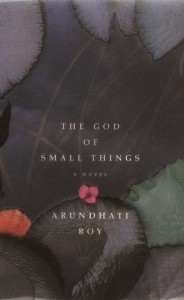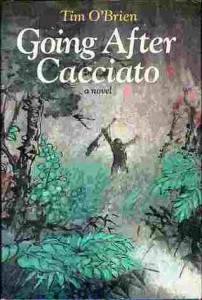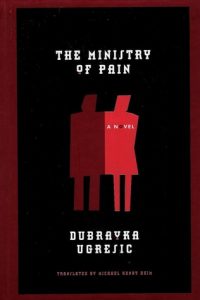 I started reading Aureole by Carole Maso because Goodreads told me that Gwendolyn Jerris wanted to read it and I needed the kind of book that Gwen loves—lyrical literature like Inner China that falls somewhere between poetry and prose. It’s a type of writing that echoes that of our shared advisor, Micheline Marcom, and one I think we both aspire to in our own way. I started reading this book because I needed to get lost in language—to see again what some of its outer limits are.
I started reading Aureole by Carole Maso because Goodreads told me that Gwendolyn Jerris wanted to read it and I needed the kind of book that Gwen loves—lyrical literature like Inner China that falls somewhere between poetry and prose. It’s a type of writing that echoes that of our shared advisor, Micheline Marcom, and one I think we both aspire to in our own way. I started reading this book because I needed to get lost in language—to see again what some of its outer limits are.What I didn’t realize until I opened the book and started reading the introduction was how very perfect this book would be for stretching my language and my thinking. To start with, it turns out that Maso is, like I, a prose writer writing poetry. Longtime readers of this blog will have seen me fall in love with all kinds of writers who dance along that line (most notably Anne Michaels and Michael Ondaatje). But when Maso started describing her process for writing this book—for the way she was deliberately reinventing her language—I was hooked. She writes “If I felt I was doing something I already knew how to do well, the rule was to start again.”
Part of my struggle is that I’ve been doing a lot of blogging lately. And I don’t mean for this blog. At work, I’m writing about content marketing and other forms of digital marketing where the very best thing I can do for the audience is write simply and clearly as I try to demystify aspects of the topic. What that’s left for this writer, though, is a large hole in my creativity where I want to be mysterious. I want to be oblique. I want to stretch pull tease and twist language until it does my bidding and my readers can learn about how to reinvent their worlds along with their words rather than following expected paths to get measurable results.
Finding Sense in Nonsense
“When they are French, which they often are, especially in bed they say dérangement. When they are French, and this is Paris, which it often is—so beautiful, so light-dappled, such light—the window opening up onto everything, everything: the tree-lined boulevard, the stars, the Tour Eiffel, she says, it’s like a cliché, only beautiful: croissant, vin rouge, fromage, French poodles, polka dots. When they are French.” – Carole Maso
Actually, the passage above is hardly nonsense, at least not in a Steinian sort of way (though I know Maso was reading Stein when she wrote this). But there is a certain amount of arbitrariness and randomness to the connection of the thoughts. When they are French? Usually Frenchness is more of a permanent state than that. This allowance that it’s an identity the two characters can put on or take off is playful and perhaps something they put on when they are in France. As this story evolves, “When they are French” also starts to mean when they are lovers or in bed. I absolutely adore the openness of this and the fact that some of the meaning I’ve just imparted comes from my head and that if you read this story, you might have an entirely different (and equally valid) meaning.
That openness of meaning is so much what I crave reading and also writing. A work that only achieves its full meaning through interaction with a reader just seems like magic to me. And although I bring my own feelings and experiences into a reading of Madame Bovary, you and I are much less likely to be able to build castles of our own interpretations of it because the narrative and language are much more conventional.
Sound
“A dream of sucking, akimbo.” – Maso
Now would probably be a good time to mention that this book is mostly comprised of erotic adventures both hetero- and homosexual. In case erotica isn’t your thing. In many places Maso exploits the softer vowel sounds so well as the crescendo of each act builds that I didn’t even see what she was doing until she interposed a different, harder sound. At some point I’d really like to re-read this book aloud just to feel her mastery of sound.
Rhythm of Language
“And she opens her hand, her life to him: a blur of wings.
And desperately.
And desperately then.” – Maso
Another thing that really makes me want to read this book aloud is the way that Maso uses the rhythm of the words. Imagine after reading an entire chapter of foreplay and play and allusions to the act of sex, reaching this peak…
You Can’t Push All the Time
All of this fabulous word play and invention of syntax and crazy sensuous juxtaposition so pushed my thinking of what words can do that when I reached a line that read “threshold of all possibility,” the mundanity of those words only highlighted how wonderful the rest of the book is. What this means for me and my writing is that if I’m going to push the limits, I’m going to have to really go for it, because the moments that I flinch or get lazy will be obvious to the careful reader. And worse, they will disappoint me if I catch myself doing it.
The Next Journey
A completely unexpected moment in this book is when Maso references India. I’m actually leaving for India in just over a week and suddenly it’s everywhere, including in A Mapmaker’s Dream, another book I read this weekend.
That sounds like a complete and total non sequitur, but I had to find some way to drop in the fact that my blogging might be a bit sporadic in October. I’ve bought all of these books:

(Two of which I’ve since read) and I plan to pack as many of them in my luggage as I can and to write when I can. Maso described a character’s “ink-stained hands (the measure of her day)” and I plan to get some of that in as well. Maybe I can find my own language in the interstices of poetry and prose. I’m sure as hell going to try.
If you want to open up the boundaries of the way you use language, pick up a copy of Aureole from Bookshop.org. Your purchase keeps indie booksellers in business and I receive a commission.
 Of The God of Small Things by Arundhati Roy, John Updike wrote, “A novel of real ambition must invent its own language, and this one does.” This quote alone is neither complimentary nor derogatory, but after reading this gorgeous book, I am awestruck at how Roy’s small tweaks to spelling, capitalization, and compound words captured both my attention and the essence of the characters and setting. The language she invents for this book is only the beginning of her ambition and every word on every page is worth the read.
Of The God of Small Things by Arundhati Roy, John Updike wrote, “A novel of real ambition must invent its own language, and this one does.” This quote alone is neither complimentary nor derogatory, but after reading this gorgeous book, I am awestruck at how Roy’s small tweaks to spelling, capitalization, and compound words captured both my attention and the essence of the characters and setting. The language she invents for this book is only the beginning of her ambition and every word on every page is worth the read. “It was a bad time. Billy Boy Watkins was dead, and so was Frenchie Tucker. Billy Boy had died of fright, scared to death on the field of battle, and Frenchie Tucker had been shot through the nose. Bernie Lynn and Lieutenant Sidney Martin had died in tunnels. Pederson was dead and Rudy Chassler was dead. Buff was dead. Ready Mix was dead. They were all among the dead.”
“It was a bad time. Billy Boy Watkins was dead, and so was Frenchie Tucker. Billy Boy had died of fright, scared to death on the field of battle, and Frenchie Tucker had been shot through the nose. Bernie Lynn and Lieutenant Sidney Martin had died in tunnels. Pederson was dead and Rudy Chassler was dead. Buff was dead. Ready Mix was dead. They were all among the dead.” We’re coming back from Croatia today, so here, at long last, is a post on Ugrešić.
We’re coming back from Croatia today, so here, at long last, is a post on Ugrešić.